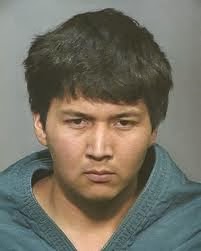 |
| Scott Curley |
It was late, sometime after 11 when photographer Matt Michela and I rolled into Fredonia. We had just checked into the Grand Canyon Motel. A dusty brown plot of worn cottages off of highway 89. The motel, wasn't for short vacation stops, it was an extended stay place that had been taken over by weary, dew rag wearing oil workers doing itinerant, back-breaking work in the surrounding oil fields. The worn-out men in their early 40's look like they are in their late 60's and stand, or more likely slump on the broken wooden porches of their worn-out cottages, pull drags from cigarettes held by their oil pocked hands, and quietly morn the lonely life they live. Our assignment desk had called ahead to make reservation, which, I am told surprised the motel's owners, since there hadn't been a reservation made at the faded pit stop in years.
 |
| Courtesy Matt Michela |
As we park our news vehicle, the shine of the headlights pulsate off of the eyes of about a dozen cats, who slink, sleep and casually lick their paws as we unload our equipment after a long day on the road. As I fumble for my room key, I notice the name of the motel, accompanied by the address: PO Box 456, Predonia, Az. Of course being in "Fredonia," I wondered if the owners, never saw the typo, or just didn't care.
As I enter my wood paneled room, the thick stink of cat urine overpowers the shabby space. As I drop my bags, I noticed the stench is not leaving, so I prop open my door, which is a reminder to about 3 cats that they enjoy peeing inside, and they marched in, giving me a look as if to say, "What, exactly, are you doing in our litter box?"
Matt and I decided to forgo more time inhaling cat urine and jumped in our news vehicle to scope out the town in which we will live for the next several days.
As we cruise down the main portion of town, a woman, suggests that an employee at the gas station across from the municipal building might be able to help us. I speak with the young woman, who nervously admits she is friends with Curley, and knows he's been having some mental health issues lately, she agrees to speak to us, but only after she is off the clock, in about 15 minutes. Matt and I set up across the street to wait.
 |
| Kane Co. Deputy Brian Harris |
The deputy, runs his tongue, from left to right, across the front of his bottom teeth, and begins speaking tersely into his shoulder mounted walkie-talkie. "You are blocking our vehicles from coming and going!" he boils at me. I sigh, and look up, and am, for a brief moment, distracted by a sky carpeted with a billion sparkling stars, but return my eyes to the deputy, "Look, you know as well as I do, that this is a public sidewalk, and we have every right to be here!" I say, raising my voice and squinting as the two of us continue our standoff. "Not if you are interfering with the easy transport of emergency vehicles!" his voice is, almost on cue, interrupted by the deep, distant howl of a prairie wolf, loud and pronounced, as I look from left to right, at a vacant, dust covered highway sleeping quietly under the bright shine of the moon. Here comes my first mistake. Sarcasm, which I've learned over the years, is always my first mistake, "Yes, I can see, it looks like Los Angeles at rush hour." I laugh as I give a sideways glance at the woman across the street who is locking the doors to the convenience store and looks nervously over her shoulder, cloaked harshly under the sickly hue of buzzing neon lights. "We are expecting more vehicles anytime now!" He is fuming at this point, "and if you stand here, you're camera will distract the officers driving." I press my chin towards my chest, and look at him in amazement, "Seriously. You just said that?"
 |
| Grand Canyon Motel |
That night as I settle in, laying, sleepless on top of the scratchy, army grade blankets, I breath in the nauseating smell of cat waste, and listen to felines howl and rustle outside. I blink and watch the ancient digital clock tick off time, from 3:32 to 3:33, and as I spot a small roach dance across the ceiling, I think, "perhaps a night in jail wouldn't have been so bad."

















